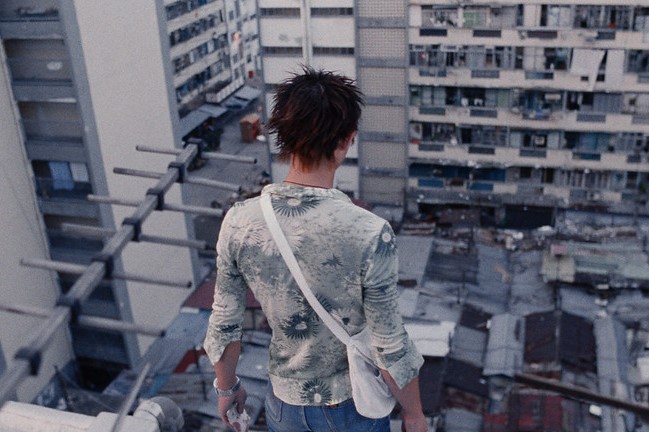The British handover of Hong Kong to China on July 1st 1997 may not be referred to explicitly in Fruit Chan’s punky drama Made in Hong Kong, but that momentous moment feels baked into the purloined film stock Chan used to film it. Made for a mere $100,000 with non-professional actors, this tale of a young gangster pulses with the uncertainty and ambiguity of a city teetering on the edge of history. It’s derivative in places, and lurches between irreverence and melodrama, but is a considerable achievement given its impoverished circumstances.
Autumn Moon (Sam Lee) is a junior triad member operating out of a dilapidated housing estate, shaking down debtors and scouting for future ‘talent’ on behalf of his boss. Most of this time he spends keeping an eye out for his simple-minded best friend Sylvester (a pretty offensive caricature from Wenders Li), who is routinely bullied. The pair discover the bloody suicide notes of a teenage girl (Ka-Chuen Tam) who has taken her own life. This seems to hit some kind of cosmic switch, as it coincides with a series of major events for the pair, not the least of which is meeting Ping (Neiky Hui-Chi Yim), a beautiful girl who is dying of renal failure.
There’s a sense of urgency that fuels Made in Hong. So much, in fact, that it soon generates a barrelling momentum which carries the film through despite its flaws and the limitations imposed by the tiny budget and magpie resources. It’s present in the bratty rebellion of its central trio as they hurtle through the city possessed by the spirit of Jules et Jim. It’s present in Moon’s nihilistic Holden Caulfield bravado. It’s present in the restless perpetual motion of the handheld camerawork. And most of all, it’s present in the limited time left to Ping.
Ping represents the strengths and the weaknesses of Made in Hong Kong. Hui gives a spiky, sweet performance in what is her only role to date, and is an intriguing foil to Moon and potentially a catalyst for him to haul himself out of the criminal orbit. She’s also the only other person who is kind to Sylvester – even the poor boy’s parents disown him after he’s hospitalised after a particularly nasty beating. Once her illness is revealed (clumsily) however, she’s rarely given any agency other than as another brick in Moon’s wall of angst. She remains a catalyst, but for Moon’s inexorable fate. As far as manic pixie dream girls go, she’s far from the most egregious example but is an ample demonstration of the film’s occasional willingness to conform to easy tropes.
The city itself is the fourth major character of the piece. Chan’s Hong Kong isn’t giving away what its preferences are, but it’s fair to say that the milieu explored are areas that neither the British nor the incoming Chinese authorities would have been keen to highlight. It’s Sphinx-like in its politics – things haven’t been so great for Moon and chums under Queen and Empire, but the film posters of My Own Private Idaho and Natural Born Killers speak of positive western influence, as well as the specificity of its time and place pointing to the likes of La Haine. The structure and style, however, echo Wong Kar-Wai’s Chunking Express, right down to Neiky Hui’s pixie-tressed resemblance to that movie’s iconic Faye Wong.
For all Made in Hong Kong is a mishmash of tones and influence, Chan demonstrates he is a fine stylist, and many of the images he achieves using the discarded film stock he cribbed from producer Andy Lau‘s studio are stunning. The melancholy scenes of the schoolgirl’s death are paradoxically lovely, bathed in a deep tint of Delft blue. Chan uses this to varying degrees, and it acts as a visual clue – it gets deeper in scenes involving Ping as her illness progresses, for instance.
It’s this beauty, and the film’s relentless drive, that stays in the memory. Made in Hong Kong may ultimately give in to melodrama as it aims for poignancy and overshoots, but this is more than forgivable. In fact, the overwrought tone it adopts is rather inkeeping with the romantic side of its brash antihero. One wonders what Chan would make of the current political situation should he be tempted by another state of the nation address. It is probably best to remember the flecks of optimism contained within the defiant bellow of Made in Hong Kong. There would likely be precious little in a contemporary update.
Available on Blu-ray from Mon 21 Sep 2020
